 Petzlover
Petzlover Broholmer is originated from Denmark but Smalandsstovare is originated from Sweden. Broholmer may grow 21 cm / 9 inches higher than Smalandsstovare. Broholmer may weigh 62 kg / 137 pounds more than Smalandsstovare. Both Broholmer and Smalandsstovare has almost same life span. Both Broholmer and Smalandsstovare has almost same litter size. Broholmer requires Moderate Maintenance. But Smalandsstovare requires Low Maintenance
Broholmer is originated from Denmark but Smalandsstovare is originated from Sweden. Broholmer may grow 21 cm / 9 inches higher than Smalandsstovare. Broholmer may weigh 62 kg / 137 pounds more than Smalandsstovare. Both Broholmer and Smalandsstovare has almost same life span. Both Broholmer and Smalandsstovare has almost same litter size. Broholmer requires Moderate Maintenance. But Smalandsstovare requires Low Maintenance
 This giant dog, the Broholmer, comes from Denmark and falls into the general Molosser type of Mastiff dog. The breed was originally developed by crossing the local German dogs with the English Mastiffs to create what is also known as a Danish Mastiff. The breed is named after an 18th century game-keeper names Sehested of Broholm. This type of dog has been present however since the Middle Ages in Europe. It started out as a stag hunting dog but quickly evolved into a guard dog. They were greatly favored by the wealthy and nobility, including being featured in portraits with King Frederick VII and Countess Danner.
This giant dog, the Broholmer, comes from Denmark and falls into the general Molosser type of Mastiff dog. The breed was originally developed by crossing the local German dogs with the English Mastiffs to create what is also known as a Danish Mastiff. The breed is named after an 18th century game-keeper names Sehested of Broholm. This type of dog has been present however since the Middle Ages in Europe. It started out as a stag hunting dog but quickly evolved into a guard dog. They were greatly favored by the wealthy and nobility, including being featured in portraits with King Frederick VII and Countess Danner.
Like many European dogs, the Broholmer, did not fare well during the second World War. During this time there was little purebred breeding and their numbers decreased almost to the point of extinction. Brought back by a group called “The Society for the Reconstruction of the Broholmer Breed”. With the support of the Danish Kennel Club, they were successful in bring the breed back. They were recognized by both the Federation Cynoloqique Internationale and the Danish Kennel Club. By 2009 they were being imported to the United Kingdom, hoping to get them onto the import lists of the United Kingdom kennel club (UKC).
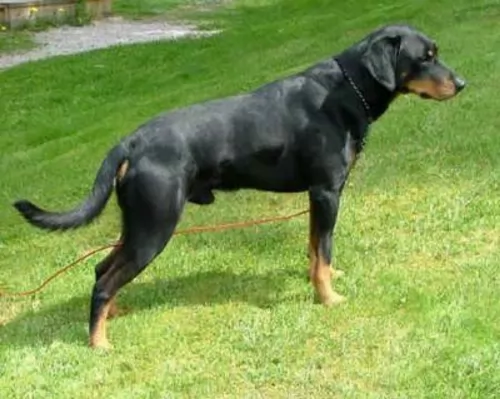 The Smålandsstövare has got quite a long history and dates back to the 1600s. He is the smallest of the Swedish hound breeds. This is a scenthound.
The Smålandsstövare has got quite a long history and dates back to the 1600s. He is the smallest of the Swedish hound breeds. This is a scenthound.
Hounds similar to the Smålandsstövare were bred with European hounds and then brought to Småland and bred with local spitz-type farm dogs to create the foundation stock for the Smålandsstövare.
The dog was used to hunt but nearly died out in the 20th century, but breeders restored it and the first official standard emerged by the Swedish Kennel Club in 1921.
The Smålandsstövare is a rare dog breed but it is recognized by the American Rare Breed Association as well as other major kennel clubs, one of which is the Federation Cynologique Internationale as well as the United Kennel Club.
 The Broholmer is a very large dog with Mastiff qualities. He is strong, rectangular and powerful in build. He has a massive head and neck with a deep and broad chest. The length of the nose is the same as the length of the skull. He is tall, well built and his thing and hindquarters are powerful. His stance and gait are powerful and intimidating as well. His appearance and size alone account for his guard dog status. However, he is a little smaller than most Mastiffs and he is athletic looking as well.
The Broholmer is a very large dog with Mastiff qualities. He is strong, rectangular and powerful in build. He has a massive head and neck with a deep and broad chest. The length of the nose is the same as the length of the skull. He is tall, well built and his thing and hindquarters are powerful. His stance and gait are powerful and intimidating as well. His appearance and size alone account for his guard dog status. However, he is a little smaller than most Mastiffs and he is athletic looking as well.
The Broholmer is a double coated breed with a short topcoat and a thick undercoat. The color of the Broholmer is yellow or a golden red. Some have white on the feet, tail tip or chest and some have a black mask. Most do not have any mask.
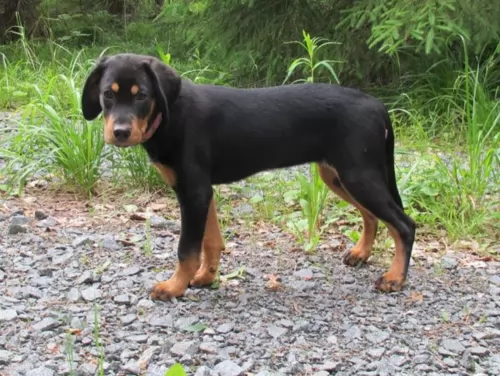 The Smålandsstövare is a muscled, compact looking dog. The double coat is shortish to medium length and is thick and quite coarse to the touch. He sheds seasonally. The coat is usually black with tan markings.
The Smålandsstövare is a muscled, compact looking dog. The double coat is shortish to medium length and is thick and quite coarse to the touch. He sheds seasonally. The coat is usually black with tan markings.
The high set ears are medium length and floppy, the head is slim and the tail can be naturally short. Sometimes the tail is long and can be slightly curved in the spitz-like sabre fashion.
The eyes are brown and friendly. The height of these dogs is about 46 to 54cm and he weighs anything from 15 to 18kg.
Usually a well behaved, quiet, calm, gentle dog, the Smålandsstövare takes his role as guard dog seriously, wanting to protect his family.
His good temperament ensures he gets on well with all members of the family. He is full of energy and will need to be exercised well, whether it be ball games in the garden, a walk around the block, a run in the park or joining his family on hikes and camping trips.
It is why he won’t settle down well on a small property in the city. He needs larger premises to expend his energy, and if in cramped premises without exercise, he may resort to barking and whining and this may well drive your neighbors bats.
Training and socializing your Smålandsstövare will be necessary and it should be easy as he is intelligent.
 The Broholmer is a calm, friendly dog. He is a large dog that thinks he is a lap dog. He wants to be close and snuggle with his people all the time. He is great with kids and other dogs. At the same time, he can be very watchful and protective. Because of this along with his size he needs a strong owner who is clearly the pack leader. He is wary and protective around strangers and can be stubborn if he thinks he is in charge.
The Broholmer is a calm, friendly dog. He is a large dog that thinks he is a lap dog. He wants to be close and snuggle with his people all the time. He is great with kids and other dogs. At the same time, he can be very watchful and protective. Because of this along with his size he needs a strong owner who is clearly the pack leader. He is wary and protective around strangers and can be stubborn if he thinks he is in charge.
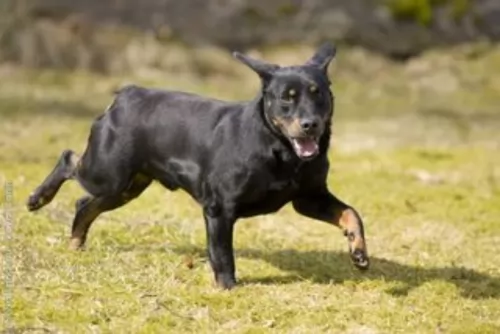 The Smålandsstövare is a robust dog with a lot of stamina. He will be wanting a lot of exercise and is ideal as a pet in the suburbs or the countryside but not ideal for city living.
The Smålandsstövare is a robust dog with a lot of stamina. He will be wanting a lot of exercise and is ideal as a pet in the suburbs or the countryside but not ideal for city living.
He makes a wonderful family pet, forming strong bonds with his owners. He makes an excellent watchdog too wanting to protect his family, and with this amicable, calm dog, you’re going to have a true friend.
 The Broholmer faces many of the same health issues as other large breeds, even though he is overall a very healthy breed. Some of the types of health issues the Broholmer might deal with include:
The Broholmer faces many of the same health issues as other large breeds, even though he is overall a very healthy breed. Some of the types of health issues the Broholmer might deal with include:
Bloat – caused by eating a large meal too quickly and drinking a lot of water or exercising too soon before or after the large meal.
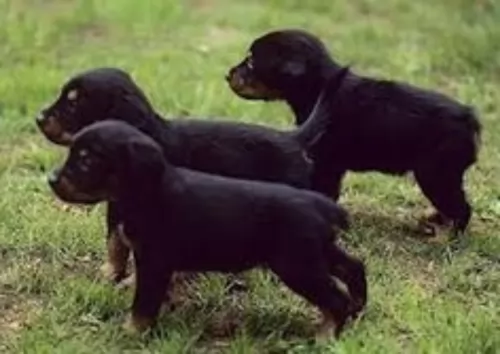 The Smålandsstövare is a rare dog breed and not much is known about congenital conditions to which he may be particularly prone.
The Smålandsstövare is a rare dog breed and not much is known about congenital conditions to which he may be particularly prone.
With good care he can reach 14 or 15 years of age. The floppy ears put him at risk for ear infections, while other conditions to watch for include hip dysplasia, cancer, bloat and obesity.
If you see your dog shaking his head or pawing at his ears, look inside because the ears may be red and inflamed. It is important to get help quickly for ear problems in dogs.
Ear canals are sensitive so if you don’t want to clean the ear and work on it yourself it is important to get your pet to the vet. The vet will clean your dog’s ears and also prescribe antibiotics.
For future treatment, you will need to clean your dog’s ears and keep them dry. If you don’t want to do this yourself, make sure to get him to professional groomers who will do this for you.
 Don’t overfeed the Broholmer. Give her about three and three quarters to nine cups of a high quality dry food. Depending on the size of your dog, adjust the amount of food within the guidelines listed here. Feed at least twice a day. Use a large breed dog food.
Don’t overfeed the Broholmer. Give her about three and three quarters to nine cups of a high quality dry food. Depending on the size of your dog, adjust the amount of food within the guidelines listed here. Feed at least twice a day. Use a large breed dog food.
Bloat – when the stomach is twisted and distended. This can cause death is not responded to by a vet immediately.
Eye Issues – Entropion turning inward of eyelids and irritating eye; Ectropium eyelids turn outward, Cataracts and Progressive Retinal Atrophy (PRA) -genetic defects of the retina can cause blindness.
The Broholmer is not an overly active dog but he is big and athletic so has strong exercise needs. A large fenced in back yard is essential or be prepared for several long walks every day. You can play inside games like teaching new tricks or hide and seek but remember this is a big dog. He would love to swim, play frisbee or ball, go hiking or organized activities such as fly ball, agility, rally and obedience. Don’t let your Broholmer over exercise while it is young and still growing. He needs as much mental stimulation as physical exercise.
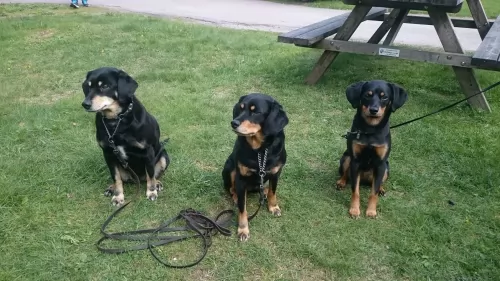 Choosing a good diet is imperative for the Smålandsstövare. Choose a commercially manufactured dog food high in vitamins and minerals.
Choosing a good diet is imperative for the Smålandsstövare. Choose a commercially manufactured dog food high in vitamins and minerals.
Give your dog a treat by providing him with some home-made food. It can be added into the dry kibble about twice a week as a treat. Boil brown rice and chicken in a pot and add in sweet potatoes, carrots and spinach. Chop all this up and give it to your dog in small portions. Also try to include some raw meat into the diet.
The Smålandsstövare is a very energetic breed and he is going to require some vigorous exercise every day. Take him for walks, allow him to run with you when you cycle or jog or take him swimming.